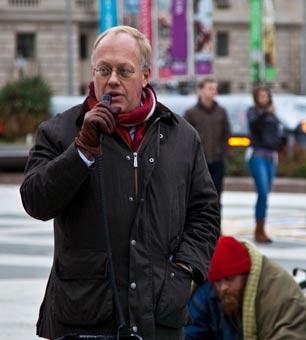 Chris Hedges speaks at Occupy DC, January 2012. (Photo: Shrieking Tree)Tipping point: when a seemingly insignificant shift in one variable causes a structural, irrevocable transformation in the system. Whether it’s the onset of a hurricane, a stock exchange crash, a star implosion, an influenza epidemic, or a nasty temper tantrum, the dynamics of the tipping point remain the same: shit hits the fan before you knew there was a fan.
Chris Hedges speaks at Occupy DC, January 2012. (Photo: Shrieking Tree)Tipping point: when a seemingly insignificant shift in one variable causes a structural, irrevocable transformation in the system. Whether it’s the onset of a hurricane, a stock exchange crash, a star implosion, an influenza epidemic, or a nasty temper tantrum, the dynamics of the tipping point remain the same: shit hits the fan before you knew there was a fan.
In politics the tipping point has an especially dramatic implication: a seemingly insignificant change in one legislation can lead to a drastic change in the system of governance.
In 1933 a seemingly innocuous new piece of legislation known as the Enabling Act empowered a relatively unpopular leader with a toothbrush moustache to become a dictator. Within a decade he would be responsible for more than 60 million violent deaths.
Very few noticed or heard about the Enabling Act before it was cited in history books. Fewer predicted its consequences. The reason is simple: predicting a tipping point is like predicting weather.
A special class of individuals is required to sniff out tipping points. Think of them as ultra-smart watchdogs. They have a freakishly sensitive nose for historical patterns. They don’t care about being barked at. They are pariahs at the edge of Hyde Park, or on the edge of society.They are not without fear. They have simply realized that hiding from their truth is more destructive than any other alternative.
In rare historical instances, watchdogs are able get their message across to a critical mass of listeners and affect real change. That’s when they’re suddenly called revolutionaries.
Jump cut to America in 2012, where 21% of children live in poverty while military spending outstrips the rest of the world’s, corporations control the electoral system, and Eisenhower’s nightmare about a military industrial takeover is in full gear. It’s a land in dire need of watchdogs.
Unfortunately, watchdogs are not politically inclined and therefore they cannot and will not change the system from the inside. It’s not in their DNA. To be a successful politician you have to be a lapdog to the masses. Watchdogs and lapdogs don’t mix.
Yet watchdogs know how the political system works. How politics and money entangle. How legislation is cooked. Hence they are a threat to the lapdogs and the corporate system. They are shunned by the media. Flagged by the national security institutions.
On March 29, 2012, I stumbled across four of them in New York, as they entered the United States District Court to bring a lawsuit against Barack Obama and the United States government.
At issue was a piece of legislation known as Section 1021 of the National Defense Authorization Act of 2012, which gives the US military the right to detain American citizens indefinitely without charge or trial. To qualify, all you need is to “substantially support” groups that the President determines to be “associated forces” of anyone “engaged in hostilities” against the U.S. or its “coalition partners.” The language is so obtuse that it can be used against anyone, including journalists or dissidents in touch with, well, someone the President doesn’t like.
As usual, the media paid no attention, either to the implementation of the law, or to the individuals who were suing the government for it.
The case bore all the hallmarks of a fully loaded tipping point for the future of American democracy.
Six weeks after the testimonies were handed out, an Obama-appointed judge delivered a judgment that surprised both the watchdogs and the lapdogs: Section 1021 of the NDAA violates both the First and Fifth Amendments of the Constitution.
It was a round 1 victory for the plaintiffs. Now it’s up to Obama’s team to figure out which way they want to tip the point. And it’s up to the rest of us to watch out for the watchdogs.They need all the help they can get.
The interviews with the plaintiffs were made during and around the court date:
– Chris Hedges, Pulitzer Prize winning author, journalist and former war correspondent with New York Times
– Tangerine Bolen, founder of RevolutionTruth,
– Alexa O’Brien, founder of US Day Of Rage
– Kai Wargalla, founder of Occupy London.
Other plaintiffs include:
Noam Chomsky
Daniel Elsberg
Birgitta Jónsdóttir
Join us in defending the truth before it’s too late
The future of independent journalism is uncertain, and the consequences of losing it are too grave to ignore. To ensure Truthout remains safe, strong, and free, we need to raise $24,000 by the end of today. Every dollar raised goes directly toward the costs of producing news you can trust.
Please give what you can — because by supporting us with a tax-deductible donation, you’re not just preserving a source of news, you’re helping to safeguard what’s left of our democracy.